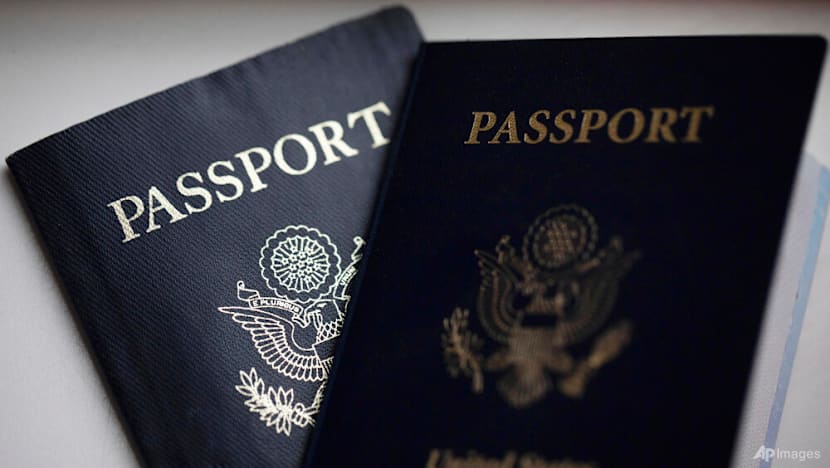US drops out of world's 10 most powerful passports list for first time in 20 years
Singapore topped the Henley Passport Index, with South Korea in second and Japan third.

US passports are arranged for a photograph in Tigard, Oregon, on Dec 11, 2021. (Photo: AP/Jenny Kane)

This audio is generated by an AI tool.
SINGAPORE: The United States has fallen out of the world’s top 10 most powerful passports for the first time in 20 years, marking a continued decline in the strength of the American passport.
According to the latest Henley Passport Index, released on Tuesday (Oct 14), the US passport now ranks 12th globally, tying with Malaysia and offering visa-free access to 180 out of 227 destinations.
Singapore, with access to 193 destinations visa-free, occupies the top spot, while South Korea came in second with 190 destinations, followed by Japan at third place with 189 destinations. The Henley Passport Index ranks a country's passport based on the number of destinations their holders can access without a prior visa. It is one of the most cited passport-power indexes, along with the Arton Capital Passport Index.
In 2014, the US passport held the top position, but this has declined over the years, and the latest ranking marks its lowest position since the index was launched 20 years ago.
Henley and Partners, a firm specialising in residence and citizenship planning, attributed the declining strength of the US passport to the lack of reciprocity, noting that while the American passport can access 180 destinations visa-free, only 46 other nationalities can enter the US without a visa.
This puts the US 77th in the Henley Openness Index, which ranks all 199 countries and territories worldwide according to the number of nationalities they permit entry to without needing a visa.
“The declining strength of the US passport over the past decade is more than just a reshuffle in rankings - it signals a fundamental shift in global mobility and soft power dynamics,” said Henley & Partners chairman Christian Kaelin and creator of the index, which utilises data from the International Air Transport Association (IATA).
“Nations that embrace openness and cooperation are surging ahead, while those resting on past privilege are being left behind.”
The American passport’s drop by two places to 12th follows a series of access changes, Henley and Partners noted. The US lost visa-free access to Brazil in April due to the lack of reciprocity, followed by it being left out of China’s expanding visa-free list.
Further changes by Papua New Guinea and Myanmar also affected the US position, while Somalia’s introduction of an e-visa system and Vietnam’s decision to exclude the US from its visa-free expansion list contributed to the drop.
The drop in the rankings also came as US President Donald Trump clamped down on immigration and travel, with international students and foreign workers targeted.
The US has also introduced a US$250 processing fee for non-immigrant visa applications and mandated in-person interviews.
The US’ disparity between visa-free access and openness is one of the widest globally, second only to Australia and just ahead of Canada, New Zealand and Japan.
Henley and Partners noted that the five nations with the biggest gaps between the travel freedom they enjoy and the openness they offer have either stagnated or declined in their passport power ranking over the past decade.
“Even before a second Trump presidency, US policy had turned inward,” said Annie Pforzheimer, a senior associate at the Center for Strategic and International Studies in Washington.
“That isolationist mindset is now being reflected in America’s loss of passport power.”
In contrast, China has made gains over the last 10 years, leaping from 94th place in 2015 to 64th in 2025, with its visa-free access score increasing by 37 destinations during that time.
China also rose dramatically on the Henley Openness Index, opening its borders to 76 nationalities – 30 more than the US.
Henley and Partners noted that China’s moves, including new agreements with Gulf states, South America, and several European counties, are cementing its position as a global powerhouse.
“Trump’s return to power has bought fresh trade conflicts that weaken America’s mobility, while China’s strategic openness boosts its global influence,” said Tim Klatte, partner at Grant Thornton China.
“These diverging paths will reshape economic and travel dynamics worldwide.”
2025 Henley Passport Index
- Singapore (193 destinations)
- South Korea (190)
- Japan (189)
- Germany, Italy, Luxembourg, Spain, Switzerland (188)
- Austria, Belgium, Denmark, Finland, France, Ireland, Netherlands (187)
- Greece, Hungary, New Zealand, Norway, Portugal, Sweden (186)
- Australia, Czech Republic, Malta, Poland (185)
- Croatia, Estonia, Slovakia, Slovenia, United Arab Emirates, United Kingdom (184)
- Canada (183)
- Latvia, Liechtenstein (182)
















